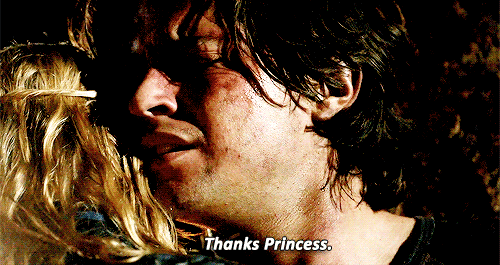
Although The 100 rarely explores issues of class anymore, its early episodes established quite the Us vs. Them mentality. The majority of the hundred delinquents sent to Earth grew up in poor sub-stations of the Ark, where access to resources was minimal. Their class status, as well as their criminal history, makes them expendable to the governing forces on the Ark. Sending them to Earth to discover if it’s still viable is apparently a-ok, even though these are literal children.
Some of the delinquents, however, grew up on Alpha Station. Among them is Clarke Griffin, who was thrown into solitary confinement because of her knowledge of the Ark’s growing oxygen crisis. On the ground, she’s singled out for not being like the other delinquents. Bellamy Blake suggests that she do the work of finding the resources they need to survive: “Let the privileged do the hard work for a change.”
Finn Collins is the first person to call Clarke a princess, as he’s floating past her in the dropship on its way to Earth. “Why so serious, princess?” he asks. Later, when she mercy kills him before the grounders can torture him, his last words are, “Thanks, princess.”

Finn’s usage of this nickname is presumably meant to be flirtatious. He likes Clarke, so much that he cheats on his girlfriend with her. He’s the first delinquent to give Clarke any kind of attention, aside from Wells. Giving her the “princess” nickname incorporates her into the group. If Finn likes her, other people should like her. Using a pet name for Clarke ultimately humanizes her.
Bellamy appropriates “princess” from Finn and uses it to separate Clarke from the rest of the group. As the daughter of the Ark’s former head engineer and the ark’s only surgeon/member of the Ark’s governing body, Abby Griffin, Clarke grew up on Alpha Station. She had significantly more access to resources – not limited to things like clothing and food, but also oxygen supply – than most of the delinquents, who grew up on working class stations.
Bellamy calls Clarke “princess” to remind the other delinquents that she’s “Ark Royalty” and can’t be trusted. No one knows why Clarke was arrested, or why she was put in solitary confinement. The mystery surrounding her only helps Bellamy’s case. She’s not really “one of them” — she’s spoiled, royal, and doesn’t care about anyone but herself. Bellamy weaponizes Finn’s nickname for her and completely alters its meaning.

Calling Clarke “princess” is a power play for Bellamy. As soon as the dropship lands on Earth, Clarke and Bellamy start to butt heads. (That dynamic continues throughout the series, even after they get closer.) If the delinquents listen to Clarke, it puts Bellamy in danger. Besides which, he has no love lost for the people still on the Ark. The council ripped Bellamy’s family apart and then opted to send a hundred kids hurtling toward potential death. Clarke wanting to bring these people to Earth doesn’t appeal to Bellamy at all.
He uses all of these talking points to make the delinquents follow his lead. Othering Clarke by calling out her class status is integral to this plan. Clarke’s diplomacy and her determination to find the resources they need to survive are very appealing, even in a Lord of the Flies situation. However, reminding the delinquents that she’s a princess born of the very people who condemned them and their families to death is a very effective means of turning people against her.
Bellamy himself is working class, although he isn’t technically one of the delinquents sent to Earth. When his sister is discovered, she’s sent to the Sky Box, his mother is executed, and Bellamy is demoted from cadet in the Ark guard to janitor. Clarke’s mom, as a member of the council, was one of the people behind these decisions. Bellamy doesn’t trust her because of her privilege, but also because of who she is. He’s on Earth because he shot the chancellor in exchange for a spot on the dropship. If the rest of the Ark comes down, he’ll be killed and his sister will be all on her own. He can’t have that.

Bellamy appeals to the delinquents’ desire to buck authority. Although he wasn’t in the Sky Box with them, he’s still one of them because he grew up poor, too. Clarke doesn’t belong in the new society they’re building. They don’t need a princess or a chancellor or anyone to tell them what to do or how to behave. At least, that’s what Bellamy argues, and for a while, it works.
But not forever. Bellamy’s attempts at anarchy prove to be really detrimental to the group as a whole, which gives Clarke the space to slide in and take over as defacto leader. Bellamy also grows to respect Clarke, and the two eventually become a leadership unit. The “princess” nickname is retired for a while.
When it returns, once, in season four, Clarke and Bellamy are equals. They both have a significant amount of blood on their hands and they’ve spent months fighting to survive on a planet that seems determined to kill them. Neither one of them is the sole leader of the delinquents (and the rest of the Arkers) now. They have to work together. When he calls her “princess”, it’s a sardonic callback to their earlier days on Earth, and it reads as an interesting commentary on how far they’ve come in just a few months.
Presumably, as the show heads into season five — which begins after a six-year time jump — the “princess” nickname will be dead completely. Although, the introduction of a new group of prisoners may prove interesting in the discussion of class status and civilization on The 100. The show began filming again on Monday. We’ll just have to wait and see.



![[PODCAST] THE COMICS AGENDA: CHUCK E CHEESE VS. ZOMBIE GEOFFREY](https://geekd-out.com/wp-content/uploads/2017/11/comics-agenda-2-150x150.jpg)